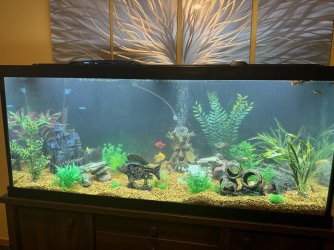Alreadyunderwater
New Member
We have a 75 gallon tank started in January 2024. We have the seachem 110 filter and a heater
Currently residing -
1 elephant nose
1 red tail shark
3 Discus
2 Angel Fish
3 Silver Dollars
3 Rainbow fish
3 Neon Tetras
4 Orange Tetras
2 Silver Tetras
4 Fancy guppies
2 bristlenose peclo algae eaters
3 Nerite snails
Currently I clean the tank every Friday with an alternating deep and cursory cleans.
Week 1 I exchange 10 gallons of water vacuuming the normally dirtiest spots in the tank. I take out the filter media basket. Swap out the blue filter for a cleaned one. Replace my finishing pad filter. Rinse the carbon filter. Swap out the purigen for one I’ve bleached clean and rinse the large filter media.
Week 2 I remove everything from half the tank. Scrub the walls of the tank. Scrub all the plants and decor. Vacuum the gravel. Put it all back, Then I do the other side. I also remove the filter scrub everything inside down to the propeller. And do everything I said above with the various media. I swap in total 20-25 gallons. New water is half filtered well water and half distilled water.
Water chemistry is stable
Ph 8
Nitrites 0
Ammonia 0
Nitrates 40
It is a ton of work. Week 1 takes almost an hour and week 2 takes 2 hours. Does this sounds like more than I should have to do. About right? Anything seem off?? It’s dirty when I clean it weekly and looks great the day after.
Thanks for any tips!!
Currently residing -
1 elephant nose
1 red tail shark
3 Discus
2 Angel Fish
3 Silver Dollars
3 Rainbow fish
3 Neon Tetras
4 Orange Tetras
2 Silver Tetras
4 Fancy guppies
2 bristlenose peclo algae eaters
3 Nerite snails
Currently I clean the tank every Friday with an alternating deep and cursory cleans.
Week 1 I exchange 10 gallons of water vacuuming the normally dirtiest spots in the tank. I take out the filter media basket. Swap out the blue filter for a cleaned one. Replace my finishing pad filter. Rinse the carbon filter. Swap out the purigen for one I’ve bleached clean and rinse the large filter media.
Week 2 I remove everything from half the tank. Scrub the walls of the tank. Scrub all the plants and decor. Vacuum the gravel. Put it all back, Then I do the other side. I also remove the filter scrub everything inside down to the propeller. And do everything I said above with the various media. I swap in total 20-25 gallons. New water is half filtered well water and half distilled water.
Water chemistry is stable
Ph 8
Nitrites 0
Ammonia 0
Nitrates 40
It is a ton of work. Week 1 takes almost an hour and week 2 takes 2 hours. Does this sounds like more than I should have to do. About right? Anything seem off?? It’s dirty when I clean it weekly and looks great the day after.
Thanks for any tips!!


